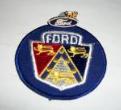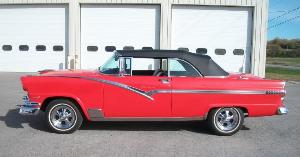|
Author
|
Message
|
|
55vickey
|
|
|
Group: Forum Members
Last Active: 11 Years Ago
Posts: 396,
Visits: 6.4K
|
I'm adjusting rockers on my 272, I'm doing it the slow way, still 6 weeks till the salt is off the roads. I'm manually turning the engine over with a wrench, when each cylinder valve starts to open I adjust the other one, I know it's slow and time consuming but its that or help in the house with spring cleaning. Any problem with doing it this way?? Thanx, Gary
 Gary, 55 Vicky, St. Germain, Wisconsin
|
|
|
|
|
oldcarmark
|
|
|
Group: Forum Members
Last Active: Yesterday
Posts: 3.7K,
Visits: 32.6K
|
The Ford shop manual suggests doing it this way.Passenger side cylinders are 1-4 from front to back.Drivers side 5-8 front to rear.Valves are as follows-EIIEEIIE on both sides.With #1 cylinder at TDC on compression-rotor at #1 on cap.Adjust #1 I and E,#2 intake,#4 exhaust,#5 exhaust,#7 intake.Rotate crank one half (1/2)turn so #4 is at TDC,Adjust #4 intake,#5 intake,#6 exhaust,#8 exhaust.Rotate 3/4 turn so you are 1/4 turn past TDC.Don't misunderstand this as I did first time and only turned TO 3/4.Adjust #2 exhaust,#3 intake and exhaust,#6 intake,#7 exhaust,#8 intake.Of course sounds like you should do it your way and avoid housework.LOL.Suggested setting is .019 cold.
 
|
|
|
|
|
Hoosier Hurricane
|
|
|
Group: Moderators
Last Active: 3 hours ago
Posts: 3.7K,
Visits: 323.1K
|
Gary: When the exhaust valve starts to open, the intake valve is just closing. At that point, the lifter is not on the base circle of the cam, so a looser valve clearance will result. Probably way loose. The most accurate way, using your slow and sure method, is to get a valve fully open, then rotate the crankshaft 1 full turn. Then adjust that valve. Lot of turning, but you seem to be in no hurry.
John - "The Hoosier Hurricane"

|
|
|
|
|
Unibodyguy
|
|
|
Group: Forum Members
Last Active: 13 Years Ago
Posts: 240,
Visits: 848
|
I've always done it the "slow" way and to me it seems to be a little more accuate. I've tried to do it the other way and always had a few that weren't quite right when I got done and had to do them over again anyway. Michael
MichaelSandy Valley, NV
|
|
|
|
|
paul2748
|
|
|
Group: Forum Members
Last Active: Yesterday
Posts: 3.6K,
Visits: 497.8K
|
I do it the same way, but use a remote starter button to turn it over.
54 Victoria 312; 48 Ford Conv 302, 56 Bird 312
Forever Ford
Midland Park, NJ
|
|
|
|
|
Hoosier Hurricane
|
|
|
Group: Moderators
Last Active: 3 hours ago
Posts: 3.7K,
Visits: 323.1K
|
OOPS! I stated the valve action backwards in my previous post. When the intake starts to open, the exhaust is just closing. End result is the same, one valve will have too much clearance. Sorry.
John - "The Hoosier Hurricane"

|
|
|
|
|
timmy4
|
|
|
Group: Forum Members
Last Active: 10 Years Ago
Posts: 280,
Visits: 523
|
The way I like to do it is to take a sparkplug out one at a time and turn the engine over with the starter by jumping the solenoid or remote switch and put my finger in the hole and feel when compression is comming up then i tap the switch to get it to the top
|
|
|
|
|
crab
|
|
|
Group: Forum Members
Last Active: 13 Years Ago
Posts: 59,
Visits: 241
|
Found this a while back. The 292 and 312 cubic inch engines are the standard engines for the 1955 through 1957 Thunderbird. These engines are equipped with mechanical valve lifters which require periodic maintenance to maintain the correct valve lash setting of .019 (nineteen thousandths of an inch). The maintenance to the valves is considered routine, yet it is the most frequently overlooked maintenance procedure. Improperly set valve lash will create a "clattering noise" which will be most noticeable at idle speed. Unless you are familiar with the workings of the internal combustion engine, you should not attempt to adjust the valve lash yourself. The information in this article, however, will provide your trusted service technician with the appropriate information needed to adjust the valves correctly. Improper adjustment of the valves can result in damage to the valves and the engine. The following reference information was obtained and submitted by Ken Smizinski and can be found in the book entitled Fix Your Ford by Bill Toboldt, copyrighted 1971: "To adjust the valves on the V-8 engines with mechanical lifters first locate the timing marks on the vibration damper, and make three chalk marks, each spaced 90 deg. from the timing mark, so that the damper is divided into four equal parts. On the 272, 292, and 312 cu.in. engines which have mechanical valve lifters, and a firing order of 1-5-4-8-6-3-7-2, crank the engine until No.1 piston is near top center on the end of the compression stroke and adjust the following valves: No.1 exhaust, No.4 exhaust, No.5 exhaust, No.1 intake, No.2 intake, No.7 intake. Rotate the crankshaft 180 deg. or one-half turn which puts No.4 piston on T.D.C. then adjust the following valves: No.6 exhaust, No.8 exhaust, No.4 intake, No.5 intake. Rotate the crankshaft 270 deg. or three-quarter turn from 180 deg. which puts No.3 piston on top center, then adjust the following valves: No.2 exhaust, No.3 exhaust, No.7 exhaust, No.3 intake, No.6 intake, No.8 intake. Valve lash should be adjusted to specified value." The above procedure is best done with the engine off. To check the valve lash settings after adjustment, however, the engine must be running at idle speed. Allow the engine to run thirty minutes before checking the valve lash. The valve lash should be .019 with the engine running at idle speed. source: CTCC Tech-Tip Manual 1993-1997 |
|
|
|
|
Ted
|
|
|
Group: Administrators
Last Active: Yesterday
Posts: 7.5K,
Visits: 205.8K
|
Here’s the link to a past thread that discusses several different methods for the tappet adjustment.
http://forums.y-blocksforever.com/Topic8614.aspx
Doing a search on this site using the key words valve adjustment will bring up other pertinent threads as well.
  Lorena, Texas (South of Waco) Lorena, Texas (South of Waco)
|
|
|
|